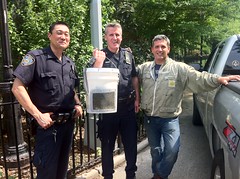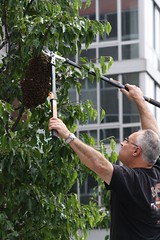The bees that swarmed on the Bowery yesterday will find a new home in Queens today. But where did they come from in the first place? The beekeeper that relocated them points to the rooftop of the Bowery Poetry Club.
Andrew Cote, a founder of the New York City Beekeepers Association who tends to around fifty bee hives around the city and sells honey at the Union Square Greenmarket, said he was summoned to Bowery and Bleecker Street yesterday by Anthony “Tony Bees” Planakis, the police department’s go-to guy for bee incidents.
After Mr. Planakis removed the swarm from a tree branch and placed it into a bucket, he and Mr. Cote received a police escort to a fenced-off area of Tompkins Square Park. There, Mr. Planakis transferred the bees from his container to Mr. Cote’s, so the beekeeper could transport them first to the Upper West Side, where he spent the night, and then to the hives of a wine distributor and novice beekeeper in Queens, who will be their new owner.
Mr. Cote, who said he had assisted in 12 similar incidents in the past five days, thinks the bees belonged to the Bowery Poetry Club. “They were bees who were mistreated, I’ll say, and who became in a sense homeless,” he said, pointing to a May 6 incident during which a neighbor of the literary bar reported a swarm above her building. “I can tell you that if the same hives are swarming over and over, then whomever is in charge of maintaining those hives properly is doing a poor job.”
Though urban beekeeping is more often associated with crunchy Brooklyn types, it just so happens that the BPC keeps bee hives on its roof and has sold “Bowery Bee” honey. But Bob Holman, owner of the Poetry Club, said the bees that were relocated to the Brooklyn Navy Yard on May 6 might not have been his. “No one knew if they were from one of my hives or were a swarm from elsewhere attracted by the sweet honey smell of the Bowery Bees,” he said.
Mr. Holman thought “the odds are small” that yesterday’s swarm was his, because at the time of the May 6 incident, he moved bees from a crowded hive to an empty one. “At my last check, everybody’s nice and comfy in there,” he said.
Bees typically swarm in the spring as a result of overcrowded hives, Mr. Cote said. “He should have taken better care of his bees,” he opined. “Bees are women. Treat them poorly and they’ll go elsewhere.” The fickle bees might have swarmed because they were in a top bar hive, which unlike Langstroth hives, are not ideal for an urban environment, he speculated. The Website of Anarchy Apiaries, which set up the apiary at Bowery Poetry Club, endorses the top bar hive as a more affordable and easy-to-manage system that breeds less anxious bees.
After the May 6 incident, the New York City Beekeepers reprimanded the Bowery Poetry Club on its Facebook page, but a neighbor of the bar who witnessed the swarm confirmed that beekeepers who responded to the incident said they might not be from the Bowery Poetry Club.
Ken Kobland, a filmmaker and editor who has lived at 306 Bowery for 35 years, said his wife E.Jay Sims, a schoolteacher, was the first to spot what he described as a football-sized swarm on some wisteria climbing from the couple’s rooftop garden up the wall of the Bowery Poetry Club’s building. “She looked out one morning and her eyes popped out – it looked like a gigantic dark swarm or nest of insects hanging in the wisteria bush high above the ground.”
Mr. Kobland said the mass was “ominous,” but harmless. In fact, he said the bees have done wonders for a ten-foot-by-twenty-foot flower garden that the couple keeps behind their building. Their pollination has had a particular effect on a crab apple tree that the couple inherited when they moved into their home in 1979. “Since we had the bees, the crab apple tree has just gone berserk,” he said. “It blossoms every fall and puts out fruit and my wife makes crab apple jam. The blossoms are just amazing.”
Mr. Cote said that swarming bees rarely sting. “It’s really more of a PR problem than an actual problem,” he said. “Bees are at their most docile when they swarm.” Nevertheless, he said, the health department levies fines for poor beekeeping.
Today, Mr. Cote is back in the East Village. A swarm that he caught yesterday in Central Park needs a new home, and a friend who keeps bees on Sixth Street in Alphabet City is willing to take them in.
Update: Poetry Club’s Beekeeper Defends Bowery Hives
This post has been revised to reflect the following correction:
Correction: May 18, 2012
An earlier version of this post misidentified the neighborhood where the bees were kept overnight. It was the Upper West Side, not the Upper East.






